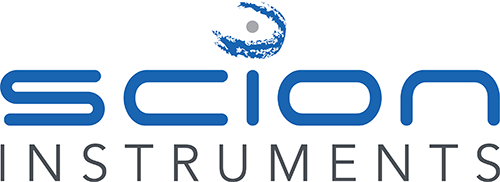ASTM D6730, Determination of Individual Components in Spark Ignition Engine Fuels
Introduction
SCION Instruments offers the solution for detailed hydrocarbon analysis (DHA). Spark ignition engine fuels consists out of hundreds of hydrocarbon compounds, with this method according to ASTM D6730 these components can be distinguished and analysed.
The ASTM D6730 describes a standard test method for individual components in spark ignition engine fuels by high resolution gas chromatography. The D6730 in comparison to the ASTM 6729 uses a pre column for pre-selection of the components.
Figure 1 shows the SCION Instruments 4X6 GC’s which this method is applicable to.
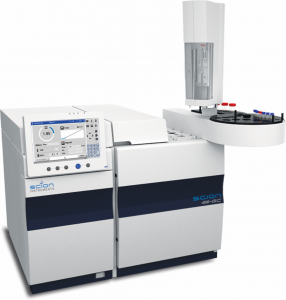
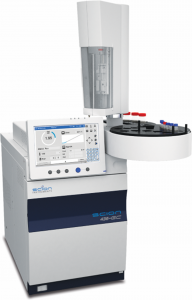
Results and Discussion
The DHA ASTM D6730 is specific for detailed individual carbon identification in spark ignition engine fuels and oxygenate blends (MTBE, ETBE, ethanol, etc) with boiling ranges up to 225°C in the concentration range from 0.01 to 30 mass %.
The majority of the hydrocarbons present in the different blends will be determined but there are a few critical compounds that have the capability of co-elution, these are the critical separations. These components are:
- 1-Methylcyclopentane – Benzene
- 2,3,3-Trimethylpentan – Toluene
- p-Xylene – 2,3-Dimethylheptane
The Scion instruments 4X6 GC’s are fine tuned in accordance with the ASTM method to ensure all specification criteria is met, or exceeded. Figure 2 shows the critical separation of these critical components.
When the sample contains a higher amount of olefins some interfering co-elution may occur, therefore it is stated that this method is less suitable when the sample contains a mass over 25 % of olefins.
The primary identification tool of this application is done with Kovats retention index. Using this index makes it easier to compare data between multiple systems. This method converts retention time to system independent numbers.
Another advantage of this index is that there are only two psychical properties that determine this factor, solubility and the n-alkanes. While in comparison, retention times are dependent on six psychical properties.

Ii = Kovats retention index peak i.
n = Carbon number n-alkane peak heading i.
N= Carbon number n-alkane peak after i.
ti = Retention time i.
to = air peak, void time.
Table 1. Analytical conditions
| Injector | Splitless 150:1, 250 °C |
| Column 1 | ASTM D6730 |
| Column 2 | SCION-DHA |
| Oven Program | 5°C (10 min), 5°C/min to 48°C (56 min), 1.3 °C/min to 200 °C (5 min) |
| Carrier | Helium |
| Pressure | 277 kPa (40 psig, constant pressure) |
| Detector | FID with ceramic jet, 250°C Air: 300 ml/min, Fuel gas (H2): 30 ml/min, Make up (N2): 30 ml/min |
| Inj. Volume | 0.1 – 0.2 µl |
| Autosampler | 8400 |
| Software | Compass CDS (with Eclipse plug in) |
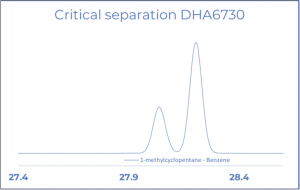
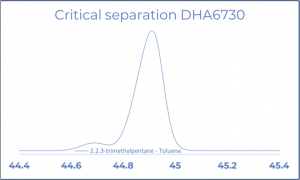
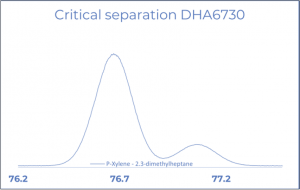
To determine the Kovats index a calibration mixture of n-paraffins was injected in the system.
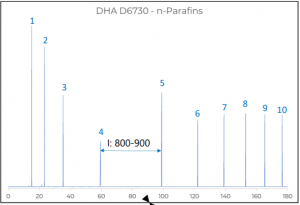
| Peak ID | Kovacs Index | Peak ID | Kovacs Index | ||
| 1 | n-C5 | 500 | 6 | n-C10 | 1000 |
| 2 | n-C6 | 600 | 7 | n-C11 | 1100 |
| 3 | n-C7 | 700 | 8 | n-C12 | 1200 |
| 4 | n-C8 | 800 | 9 | n-C13 | 1300 |
| 5 | n-C9 | 900 | 10 | n-C14 | 1400 |
Figure 3: Chromatogram of the n-parrafins calibration mixture to determine the Kovats Index (I = Kovats index).
The indexes found are compared with known data in the database and the rest of the peaks are signed accordingly.
The next step is to determine the repeatability of seven components by injecting a Reformate sample. The specification set in the ASTM D6730 states that the standard deviation should not exceed 0.1. Table 3 shows an example of a Scion DHA D6730 analyser with excellent repeatability.
Table 2. Standard deviation of 5 consecutive injections.
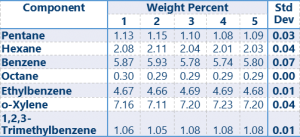
A variety of different sample types were injected in the Scion DHA analyser. Select compounds are shown, demonstrating the flexibility of the Scion instrumentation. All compounds were successfully identified.
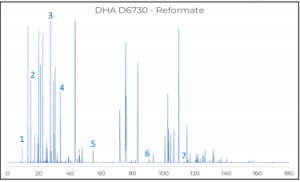
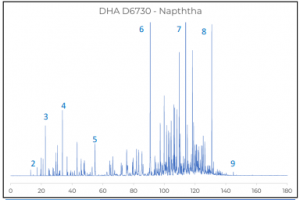
| Peak ID | Peak ID | Peak ID | |||
| 1 | n-C4 | 4 | n-C7 | 7 | n-C10 |
| 2 | n-C5 | 5 | n-C8 | 8 | n-C11 |
| 3 | n-C6 | 6 | n-C9 | 9 | n-C12 |
Figure 4: Chromatogram of a Reformate and Naphtha sample.
Figure 4 shows an example chromatogram of a Reformate and Naphtha sample while figure 5 shows an example of a Racing fuel.
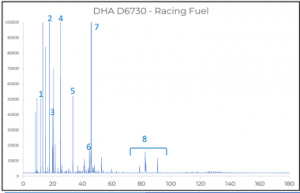
| Peak ID | Peak ID | ||
| 1 | Ethanol | 5 | 2,2,4-trimethylpentane |
| 2 | 2,2-Dimethylbutane | 6 | 2,3,3-Trimethylpentane |
| 3 | 2,3-Dimethylbutane | 7 | Toluene |
| 4 | ETBE | 8 | EB + Xylenes |
Figure 5: Chromatogram of a Racing fuel sample
When analysing all the data the CompassCDS Eclipse plug in will be used. This is an addition to the basic Eclipse and this will provide all the tools to calculate the necessary data. Figure 6 shows an example how the chromatogram will look like and as shown it is also possible to select other ASTM methods.
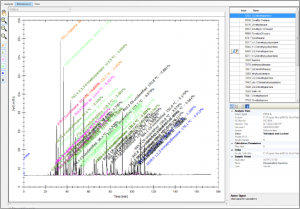
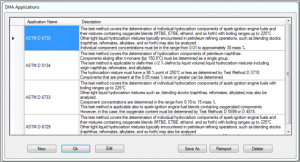
Conclusion
SCION Instruments provides a robust, high resolution, complete solution for ASTM D6730 DHA analysis.
The Scion 436 or 456-GC is equipped with industry standard and inert GC hardware. The analyser is easy to service due to great accessibility and minimal downtime.
Another unique feature of the Scion instruments 4X6-GC is the possibility for a dual DHA of even a triple DHA. It is possible to add a channel according to ASTM D6729, D6730, D6733, D5134 ,Fast DHA or even other analytical channels.
When chosen for a triple channel DHA keep in mind that a XYZ sample like EST Flex or CTC combipal is needed to utilize all the injectors.
Please contact our pre-sales experts for all the possibilities.
Download Application Note – ASTM D7360 Determination of Individual Components in Spark Ignition Engine Fuels
Download complete Application Note: ASTM D6730, Determination of Individual components in spark ignition engine fuels.
SCION GC
Find out more about the SCION GC. The perfect gas chromatograph for many applications without compromise on functionality and performance. If you would like to talk to a member of our sales team about any of these products, please feel free to contact us and someone will be happy to help.
